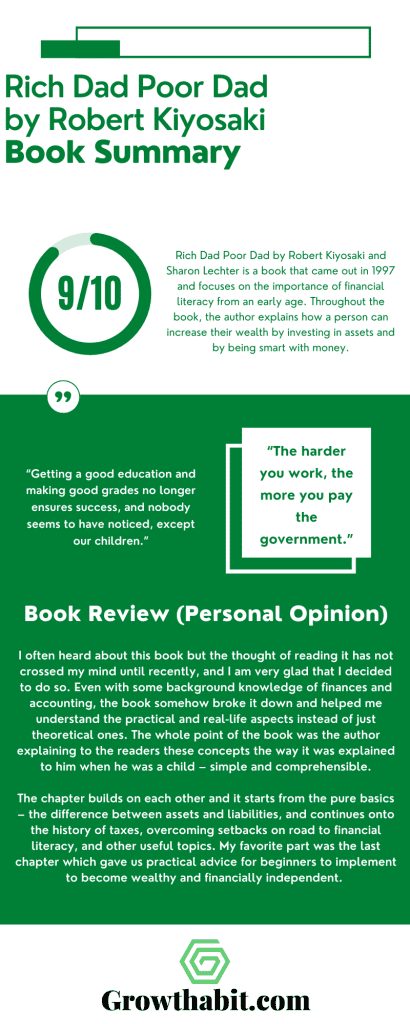Rich Dad Poor Dad by Robert Kiyosaki and Sharon Lechter is a book that came out in 1997 and focuses on the importance of financial literacy from an early age.
Throughout the book, the author explains how a person can increase their wealth by investing in assets and by being smart with money.
https://www.youtube.com/watch?v=Xi7wpeqY9zs&t
Book Title— Rich Dad Poor Dad
Author— Robert Kiyosaki, Sharon Lechter
Date of Reading— February, 2023
Rating— 9/10
https://www.youtube.com/watch?v=ATrKaXZbmng
What Is Being Said In Detail
Rich Dad Poor Dad follows snippets of Robert Kiyosaki’s childhood as he starts learning about money from the young age of nine.
The name of the book comes from Kiyosaki’s real father who was the “poor dad” and his friend’s father who was the “rich dad”.
His real father was a professor who earned a lot yet always struggled financially, while his friend’s father, an entrepreneur who left school at an early age ended up as one of the richest people in Hawaii.
Kiyosaki often tried to understand the perspective of both his rich dad and poor dad, however, his rich dad’s advice is what helped him gain knowledge of finances and acquire wealth.
The book introduces the concepts of cash flow, balance sheet, income statement, assets, and liabilities in a simple manner, easy for everyone to understand.
The author wishes that everyone was taught the basics of finances from childhood like he was, which he lists as one of the reasons for writing this book.
The importance of knowing the difference between assets and liabilities and focusing on investing in assets is emphasized through multiple chapters and called “the number one and the only rule”.
Rich Dad Poor Dad consists of 10 chapters and an epilogue.
Chapters contain simple explanations of basic finance concepts, often followed by pictures and examples from the author’s life or from his family and friends.
Introduction
Introduction explains the idea behind the book and emphasizes the importance of financial literacy over the standard, outdated education received at school.
In the wake of constant global and technological changes, knowledge of finances might just be of the greatest use for financial independence.
Chapter One
Chapter 1 highlights the contrast between Robert’s rich dad and poor dad, as it shows both of their perspectives on money and wealth.
Robert decides to follow the rich dad’s advice, which were based on six lessons:
- The Rich Don’t Work for Money,
- Why Teach Financial Literacy,
- Mind Your Own Business,
- The History of Taxes and the Power of Corporations,
- The Rich Invent Money, and
- Work to Learn Don’t Work for Money.
Chapter Two – Lesson One: The Rich Don’t Work For Money
In Chapter 2 Robert and his friend Mike ask Mike’s dad, the rich dad, to teach them how to be wealthy and successful.
They start working for him every Sunday, and at the age of 9 learn what it is like to live as an average adult – earning money and spending it. Rich dad advises them to use their head over emotions when it comes to money.
Chapter Three – Lesson Two: Why Teach Financial Literacy?
In Chapter 3 Robert speaks about, as he says, ‘rule number one and the only rule’, which goes as follows “You must know the difference between an asset and a liability, and buy assets”.
This chapter contains simple drawings explaining the basics of cash flow, income statements, and balance sheets.
Chapter Four – Lesson Three: Mind Your Own Business
Chapter 4 suggests that a person should focus on increasing their assets and in that way “work for themselves”, instead of working and earning money for someone else their whole lives (for employer, government, bank).
Chapter Five – Lesson Four: The History of Taxes and The Power of Corporations
Chapter 5 talks about the history of taxes and how understanding that concept and making it work to one’s advantage makes the difference between the rich and poor or middle class.
The importance of financial IQ is also mentioned and it is based on four areas: accounting, investing, understanding markets, and the law.
Chapter Six – Lesson Five: The Rich Invent Money
Throughout Chapter 6 Robert explains how even “risky” investments are not gambling if one knows what they are doing; it becomes gambling “if you’re just throwing money into a deal and praying”.
He argues that financial intelligence is knowing how to take good opportunities that come your way.
Kiyosaki also talks about CASHFLOW, the investment game he came up with in order to make investing easier to comprehend for people with different backgrounds
Chapter Seven – Lesson Six: Work to Learn – Don’t Work for Money
Chapter 7 describes how knowing a little bit about a lot is better than specializing in just one thing.
Kiyosaki notes that the main management skills needed for success are management of cash flow, management of systems, and management of people.
Chapter Eight – Overcoming Obstacles
Chapter 8 states five reasons why even financially literate people might not acquire assets that will produce a satisfying cash flow.
- Fear. Overcoming fear is learning how to manage it and accept failure. Kiyosaki suggests that losers avoid failing, while failure turns losers into winners.
- Cynicism. The best way to defeat cynicism is to analyze because by doing so, we identify opportunities that critics most likely miss.
- Laziness. Instead of being lazy and saying we cannot do something, one should be a little greedy by searching for answers and solutions to their issue.
- Bad habits. The solution for bad habits is the motivation that fuels us to work harder and be smarter when it comes to money.
- Arrogance. The cure to arrogance is realizing and accepting our ignorance, and choosing to educate ourselves on the subject.
Chapter Nine – Getting Started
Chapter 9 offers ten steps to awaken financial genius:
- Find a reason greater than reality: the power of spirit. Strong sense of purpose is needed to do most things in life.
- Make daily choices: the power of choice. We make a choice of what to think, what to do with our time and money, and so on.
- Choose friends carefully: the power of association. Having rich friends means you can learn from them about money.
Another important thing to note is that a person needs to stay true to themselves on the road to wealth.
- Master a formula and then learn a new one: the power of learning quickly. Being careful about what we study is important because we become what we study.
Rather than what we know, how fast we learn is more important in the information age.
- Pay yourself first: the power of self-discipline. Self-control and a high tolerance for financial pressure are necessary to become rich.
- Pay your brokers well: the power of information. As Robert says, the more money brokers make, the more money we make.
- Be an Indian giver: the power of getting something for nothing. The first thing investors should think about is how to get their money back quickly.
- Use assets to buy luxuries: the power of focus. Use assets instead of liabilities to buy luxuries.
- Choose heroes: the power of myth. Emulating our heroes makes things look easier and inspires us.
- Teach and you shall receive: the power of giving. Whenever we want something, we need to give the thing we want in order to receive it.
If we want knowledge, money, or information, we should first give those things to others in order to receive them.
Chapter Ten – Still Want More? Here are Some To Do’s
In Chapter 10 the author shares some practical steps on how to start the journey of financial literacy and wealth, such as looking for new ideas, finding someone who has done what we want to do, taking classes, reading and attending seminars, making a lot of offers, and learning from history.
One of the more compelling steps instructs that “action beats inaction”.
Epilogue
In Epilogue the reader is offered an example of how to afford education for children and provide for retirement based on the case of Robert Kiyosaki’s friend.
The author also invites the reader to learn how to make money work for them and therefore have an easier and happier life.
Most Important Keywords, Sentences, Quotes
INTRODUCTION
“Getting a good education and making good grades no longer ensures success, and nobody seems to have noticed, except our children.”
“At my table was a banker, a business owner and a computer programmer.
What greatly disturbed me was how little these people knew about either accounting or investing, subjects so important in their lives.”
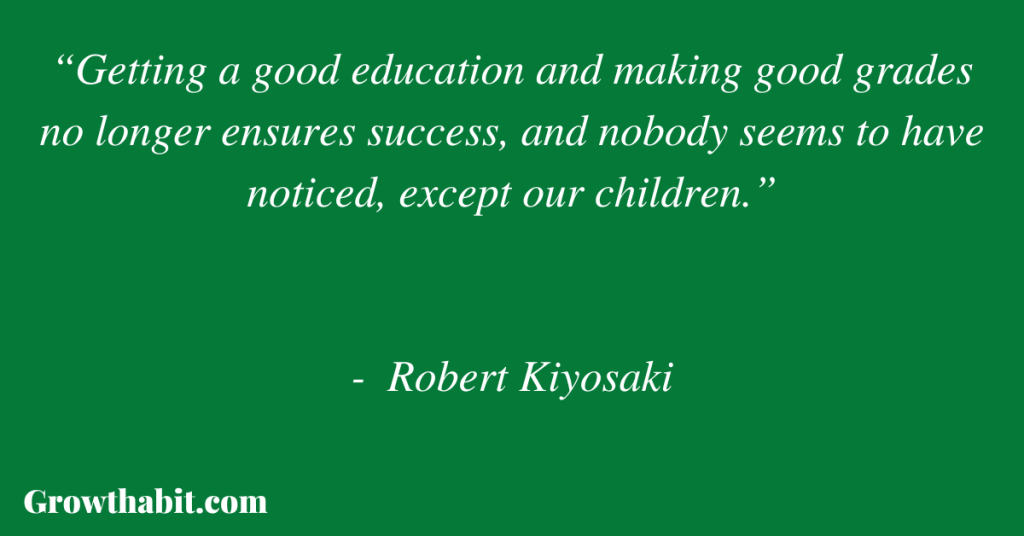
“He knows that the world has changed, but education has not changed with it.
According to Robert, children spend years in an antiquated educational system, studying subjects they will never use, preparing for a world that no longer exists.”
“Remember that financial intelligence is the mental process via which we solve our financial problems.”
CHAPTER ONE
“Both men offered me advice, but they did not advise the same things. Both men believed strongly in education but did not recommend the same course of study.”
“Although both dads worked hard, I noticed that one dad had a habit of putting his brain to sleep when it came to money matters, and the other had a habit of exercising his brain.
The long-term result was that one dad grew stronger financially and the other grew weaker.”
“My poor dad would also say, ‘I’m not interested in money,’ or ‘Money
doesn’t matter.’ My rich dad always said, ‘Money is power.’”
CHAPTER TWO – Lesson One: The Rich Don’t Work For Money
“Most of the time, life does not talk to you. It just sort of pushes you around.
Each push is life saying, ‘Wake up. There’s something I want you to learn.’”
“Or if you’re the kind of person who has no guts, you just give up every time life pushes you. If you’re that kind of person, you’ll live all your life playing it safe, doing the right things, saving yourself for some event that never happens.”
“I’ll bet you that I earn more than your dad, yet he pays more in taxes.”
“They work very hard, for little money, clinging to the illusion of job security, looking forward to a three-week vacation each year and a skimpy pension after forty-five years of work.”
“Let me finish the other emotion, which is desire. Some call it greed, but I prefer desire. It is perfectly normal to desire something better, prettier, more fun or exciting.”
“The main cause of poverty or financial struggle is fear and ignorance, not the economy or the government or the rich. It’s self-inflicted fear and ignorance that keeps people trapped.”
CHAPTER THREE – Lesson Two: Why Teach Financial Literacy?
“Our assets are large enough to grow by themselves. It’s like planting a tree. You water it for years, and then one day it doesn’t need you anymore.”
“Rich people acquire assets. The poor and middle class acquire liabilities that they think are assets.”
“An intelligent adult often feels it is demeaning to pay attention to simplistic definitions.”
“Rich dad believed in the KISS principle—Keep It Simple, Stupid (or Keep It Super Simple)—so he kept it simple for us, and that made our financial foundation strong.”
“‘In accounting,’ rich dad would say, ‘it’s not the numbers, but what the numbers are telling you. It’s just like words.’”
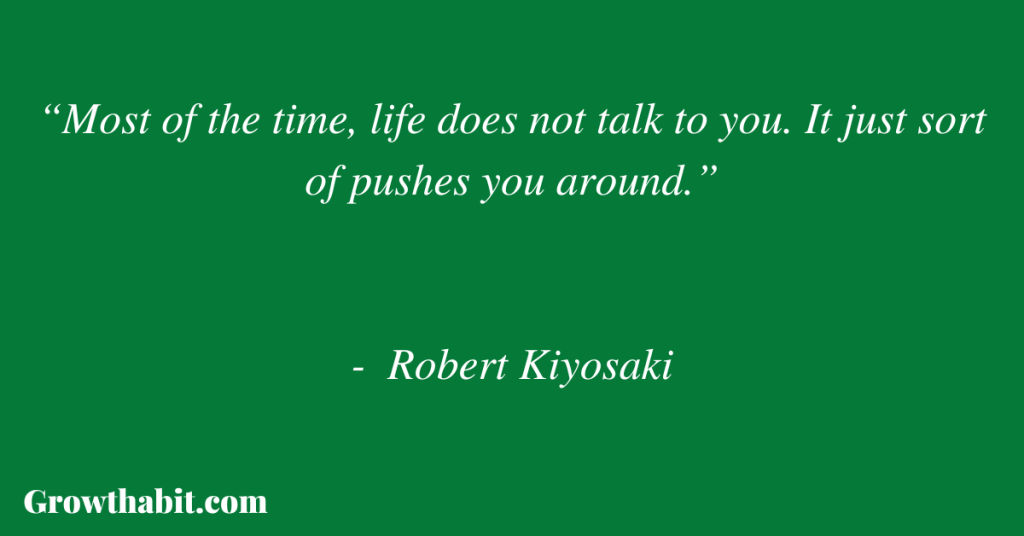
“Cash flow tells the story of how a person handles money.”
“What is missing from their education is not how to make money, but how to manage money.”
“A person can be highly educated, professionally successful, and financially illiterate.”
CHAPTER FOUR – Lesson Three: Mind Your Own Business
“To become financially secure, a person needs to mind their own business.”
“The better I was at understanding the accounting and cash management, the better I would be at analyzing investments and eventually starting and building my own company.”
“An important distinction is that rich people buy luxuries last, while the poor and middle class tend to buy luxuries first.”
CHAPTER FIVE – Lesson Four: The History of Taxes and The Power of Corporations
“My rich dad did not see Robin Hood as a hero. He called Robin Hood a crook.”
“It was difficult to go to work for one of the biggest capitalists in town and come home to a father who was a prominent government leader. It was not easy to know which dad to believe.”
“The harder you work, the more you pay the government.”
“If you work for money, you give the power to your employer. If money works for you, you keep the power and control it.”
“My money was working hard to make more money. Each dollar in my asset column was a great employee, working hard to make more employees and buy the boss a new Porsche with before-tax dollars.”
CHAPTER SIX – Lesson Five: The Rich Invent Money
“We all have tremendous potential, and we all are blessed with gifts. Yet the one thing that holds all of us back is some degree of self-doubt.”
“Old ideas are their biggest liability. It is a liability simply because they fail to realize that while that idea or way of doing something was an asset yesterday, yesterday is gone.”
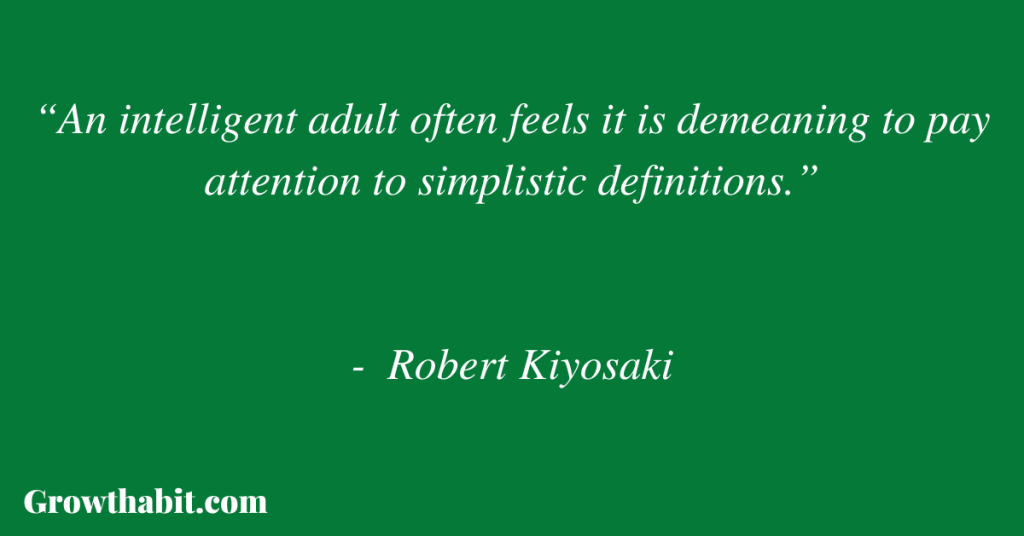
“Most people have an opportunity of a lifetime flash right in front of them, and they fail to see it. A year later, they find out about it, after everyone else got rich.”
“Financial intelligence is simply having more options.”
“The single most powerful asset we all have is our mind. If it is trained well, it can create enormous wealth.”
“Another case for developing your financial intelligence over a lifetime is simply that more opportunities are presented to you.”
“It is not gambling if you know what you’re doing. It is gambling if you’re just throwing money into a deal and praying.”
“Great opportunities are not seen with your eyes. They are seen with your mind.”
CHAPTER SEVEN – Lesson Six: Work to Learn – Don’t Work for Money
“I am constantly shocked at how little talented people earn.”
“‘You want to know a little about a lot’ was rich dad’s suggestion.”
“Job is an acronym for ‘Just Over Broke.’”
“Once people are trapped in the lifelong process of bill-paying, they become like those little hamsters running around in those metal wheels.”
“So I wonder: Are workers looking into the future or just until their next paycheck, never questioning where they are headed?”
“I know of no other skills to be more important than selling and marketing.”
“The better you are at communicating, negotiating, and handling your fear of rejection, the easier life is.”
CHAPTER EIGHT – Overcoming Obstacles
“The primary difference between a rich person and a poor person is how they manage that fear.”
“For most people, the reason they don’t win financially is because the pain of losing money is far greater than the joy of being rich.”
“Losers avoid failing. And failure turns losers into winners.”
“Rich dad explained that criticism blinded while analysis opened eyes. Analysis allowed winners to see that critics were blind, and to see opportunities that everyone else missed. And finding what people miss is key to any success.”
“So what is the cure for laziness? The answer is—a little greed.”
“If I pay myself first I get financially stronger, mentally and fiscally.”
“When you know you are ignorant in a subject, start educating yourself by finding an expert in the field or a book on the subject.”
CHAPTER NINE – Getting Started
“A reason or a purpose is a combination of ‘wants’ and ‘don’t wants’.”
“I’ve learned that, without a strong reason or purpose, anything in life is hard.”
“Financially, with every dollar we get in our hands, we hold the power to choose our future: to be rich, poor, or middle class.”
“In today’s fast-changing world, it’s not so much what you know anymore that counts, because often what you know is old. It is how fast you learn.”
“Simply put, people who have low self-esteem and low tolerance for financial pressure can never be rich.”
“Too often today, we focus on borrowing money to get the things we want instead of focusing on creating money.”
“Copying or emulating heroes is true power learning.”
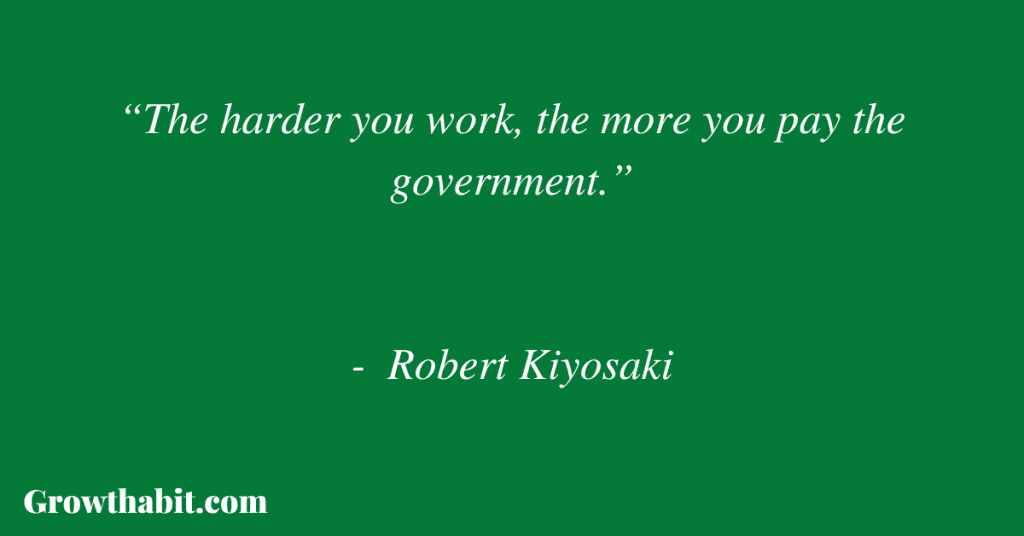
“Whenever you feel short or in need of something, give what you want first and it will come back in buckets.”
CHAPTER TEN – Still Want More? Here are Some To Do’s
“The definition of insanity is doing the same thing over and over and expecting a different result.”
“I also attend and pay for expensive seminars on what I want to learn. I am wealthy and free from needing a job simply because of the courses I took.”
EPILOGUE
“Without financial training, we all too often use the standard formulas to get through life: Work hard, save, borrow, and pay excessive taxes. Today, more than ever, we need better information.”
“It takes only a few dollars to start and grow it into something big.”
“With each dollar bill that enters your hand, you and only you have the power to determine your destiny. Spend it foolishly, you choose to be poor. Spend it on liabilities, you join the middle class.
Invest it in your mind and learn how to acquire assets and you will be choosing wealth as your goal and your future.”
Book Review (Personal Opinion):
I often heard about this book but the thought of reading it has not crossed my mind until recently, and I am very glad that I decided to do so.
Even with some background knowledge of finances and accounting, the book somehow broke it down and helped me understand the practical and real-life aspects instead of just theoretical ones.
The whole point of the book was the author explaining to the readers these concepts the way it was explained to him when he was a child – simple and comprehensible.
The chapter builds on each other and it starts from the pure basics – the difference between assets and liabilities, and continues onto the history of taxes, overcoming setbacks on road to financial literacy, and other useful topics.
My favorite part was the last chapter which gave us practical advice for beginners to implement to become wealthy and financially independent.
Rating: 9/10
This Book Is For:
- Parents who want to teach their children to be responsible and smart with money
- Young individuals who seek wealth and independence and need a place to start
- People who want to invest in assets such as real estate
If You Want To Learn More
Robert Kiyosaki explains how you can make money from nothing and other topics contained in his book in this 2018 interview at New Orleans Investment Conference.
https://www.youtube.com/watch?v=Xi7wpeqY9zs&t
How I’ve Implemented The Ideas From The Book
This book motivated me to start taking matters into my own hands through small steps.
I started reading about investing and subscribed to the Wall Street Journal, where I sometimes spend hours reading articles on current business affairs and following stock market news.
One Small Actionable Step You Can Do
Kiyosaki mentions the educational board game he came up with multiple times in the book, called CASHFLOW.
It is a game designed for people who want to learn the fundamentals of investing through a fun simulation. Try playing it for free on Kiyosaki’s website www.richdad.com and see how well you understand the principles explained in the book.
